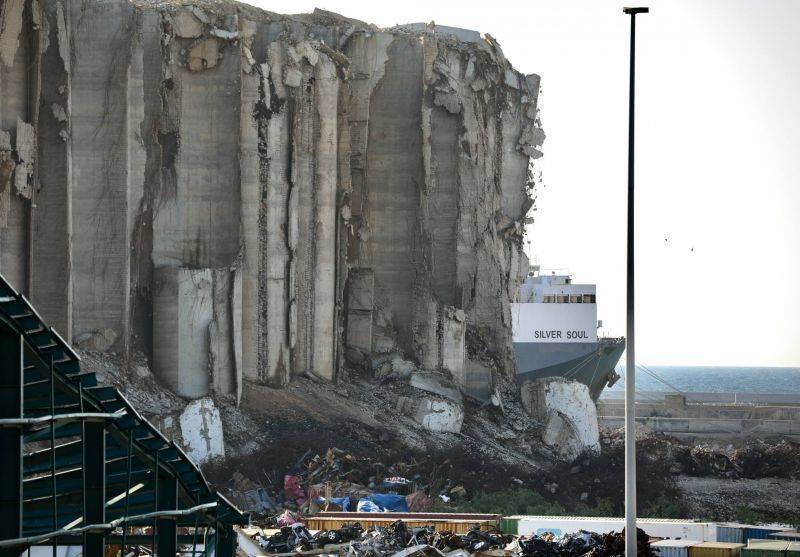
Damaged silos in the port of Beirut on April 14, 2022. (Credit: Matthieu Karam/L'Orient-Le Jour)
Want to get the Morning Brief by email? Click here to sign up.
Relatives of the victims of the Aug. 4 Beirut Port blast, filed a lawsuit in the US state of Texas against the company responsible for chartering the boat carrying the fatal ammonium nitrate, which was stored for six years at the Beirut port. The American-Norwegian geophysical services group TGS ASA entered into a series of “suspicious contracts” in 2019 with Lebanon’s Ministry of Energy and Water controlled by the Free Patriotic Movement, a press release issued by Accountability Now, a Swiss foundation that is assisting the victims' families in the case, alleged. The plaintiffs are seeking damages of $250 million from the company for lost human life and property resulting from the blast. In Lebanon, the port blast investigation has been stalled for months, because of multiple complaints filed against lead investigator, Judge Tarek Bitar, by political figures he had summoned for questioning, who have refused, so far, to appear before the court.
Meanwhile, the Beirut port grain silos, severely damaged in the same blast, continue to mysteriously burn. Yesterday, caretaker Public Works Minister Ali Hamieh told L’Orient Today that he had barred firefighters from approaching the silos to attempt to extinguish the blaze, saying that there was danger the silos would collapse. Hamieh, chosen by Hezbollah, cited a decision by the Higher Defense Council to this effect. He added that there were two options: the first being to let the grains burn, and the second being to demolish the bottom portion of the silos and to remove the leftover wheat. The first of the mysterious fires broke out on Thursday and was put out. Officials have blamed the fires on fermentation of grains left in and around the silos. Fires broke out again on Monday and Tuesday. Families of the victims have described the fires as suspicious and accused officials of using them as an excuse to demolish the silos. The Public Works Minister has denied these claims. The Cabinet, of which Hamieh is a part of, voted to approve the destruction of the port silos in March 2022, despite opposition from families of the victims and activists. Also yesterday, families of the victims protested in front of the port again, due to the lack of response from officials to the fires.
Caretaker Energy Minister Walid Fayad has proposed increasing electricity tariffs to prolong an Iraqi fuel program. Fayad told L’Orient Today yesterday that he made the proposal to Iraq so as to be able to pay for a new fuel deal. Lebanon has not paid the oil-producing nation for the previous fuel deal, set to expire in September. Under the terms of that deal, Lebanon was to receive some 1 million tons of fuel from Iraq for its power plants under a swap arrangement. In exchange, Banque du Liban would open an account for the Iraqi central bank, into which Lebanon will deposit so-called fresh dollars to purchase the fuel. Upon receiving payment, Iraq will be able to withdraw the money only in lira at the parallel market rate or at the rate on BDL’s exchange platform, Sayrafa. The Iraqi government can then use the lira to buy unspecified goods and services from Lebanon. The deal is set to expire in September, and Lebanon has not yet paid the bill. The country at present is relying heavily on the Iraqi deal to produce the few hours a day of electricity provided by state power utility Électricité du Liban. Fayad noted that he was looking for other Arab countries that might also be willing to provide fuel, citing Algeria as one possibility.
In case you missed it, here’s our must-read story from yesterday: "Behind the numbers: How Lebanon's crisis is felt on the roads."